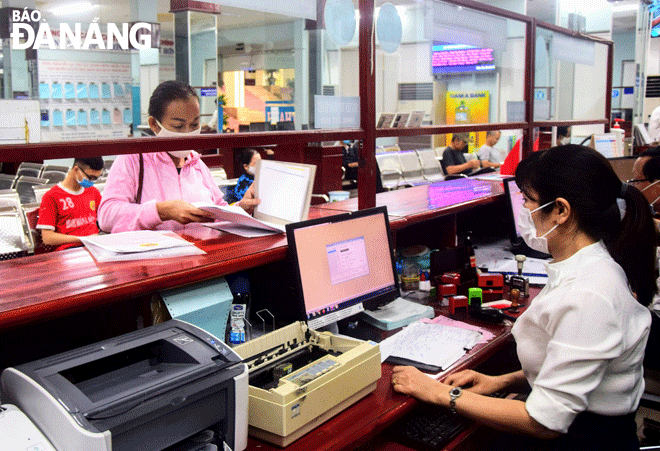Da Nang on course to develop data for sake of digital transformation
Data acts as a resource, a prerequisite for digital transformation. Over the past time, Da Nang has built up and put into use many databases, serving the search and exploitation demand among citizens and businesses.
 |
| By the end of 2022, each aspect in Da Nang will have issued a list of open data under its management. Citizens are seen having their administrative dossiers handled at the ‘One-stop shop’ site of the Thanh Khe District Administrative Centre. Photo: P.LAN |
According to the Da Nang Department of Information and Communications, the city has so far completed the construction of basic databases such as citizen databases (more than 1.3 million data, reaching 100% of the population), enterprise database (44,000 data, reaching 100%, household registration database (nearly 267,000 household records, reaching 96% and more than 1 million demographic records, reaching 96%), land database and land information publicity at the Da Nang Land Portal, database of cadres, civil servants and public employees (30,850 data, reaching 100%), administrative procedure database (100% administrative procedures).
The above-mentioned databases are all connected and shared through the egov system platform.
As for specialised databases, currently, agencies and the district-level authorities in the city have built up and put into use 560 specialised databases on civil status, notary, labor, education, health records and online residence in provision for public services.
The city has started piloting the city-wide shared data warehouse to collect and standardize background databases and a number of specialised (structured) databases for sharing and intelligent data analysis.
The open data portal currently provides more than 570 data sets in the socio-economic fields publicly for citizens and businesses to look up via website, API, SMS and Zalo. In particular, the city has begun using some digital data instead of paper-based components in providing public services such as certificates of land use rights, household registration books and business registration certificates.
Mr. Nguyen Quang Thanh, Director of the municipal Department of Information and Communications, said that, in addition to the database of officials, civil servants, public employees and the enterprises which are quite quality, the citizen database has not been updated in time from the arising reality.
In reality, data still depend on the national background database, population and land for instance, and the database of ministries and branches such as tax, customs, statistics and social insurance.
For the time being, the database of the natural resources and environment industry is still being stored in a distributed manner at the Centre for Information Technology of Natural Resources and the Environment under the Department of Natural Resources and the Environment in line with the national government's regulations.
For the 2022 – 2025 period, Da Nang will focus on developing, perfecting and effectively putting into use specialised State management software and databases, integrating them into national and specialized databases operated by national ministries and agencies through an integrated platform, share national data, and bringing them to a shared data warehouse in the city for use by local agencies and units.
Besides, heed will be paid to developing a shared data warehouse for the whole city, allowing to collect, store and aggregate data from many different data sources that are structured, semi-structured and unstructured), as well as analyze, handle and support decision-making processes.
In addition, the city will supplement, update and complete the open data portal according to domestic and international open standards, integrate it with the national data portal at data.gov.vn and the digitalized Vietnamese Knowledge System, which enables Vietnamese citizens to share knowledge conveniently and effectively.
By the end of 2022, each agency and grassroots locality shall issue a list of open data under its management, annually provide at least 5 sets of open data (in machine-readable form and share as API application programming interface service) for publication on the city's open data portal for people and businesses to look up, exploit and use.
Agencies and localities shall develop plans on piloting a type of digital data managed by their units such as population, business, household registration, civil status, land affairs and construction to replace the paper-based documents whilst carrying out administrative procedures.
Reporting by PHONG LAN – Translating by A.THU